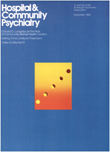Time-Limited Residential Treatment: Issues and Evaluation
Abstract
The trends toward deinstitutionalization and community care have increased the need for short-term residential programs, and the literature supports their effectiveness as an alternative to longer-term care. The authors describe an innovative short-term residential treatment program at Florida Mental Health Institute. Called the Early Intervention Project and limited to nine weeks, it uses a combination of behavioral and psychoeducational techniques for building skills in younger patients who have not received extensive prior treatment. It includes training modules in assertiveness, communication, problem-solving, managing anxiety and depression, medication, relaxation, and nutrition, and also incorporates a peer-managed token economy. A series of research studies have demonstrated the program's effectiveness in changing patient behavior.
Access content
To read the fulltext, please use one of the options below to sign in or purchase access.- Personal login
- Institutional Login
- Sign in via OpenAthens
- Register for access
-
Please login/register if you wish to pair your device and check access availability.
Not a subscriber?
PsychiatryOnline subscription options offer access to the DSM-5 library, books, journals, CME, and patient resources. This all-in-one virtual library provides psychiatrists and mental health professionals with key resources for diagnosis, treatment, research, and professional development.
Need more help? PsychiatryOnline Customer Service may be reached by emailing [email protected] or by calling 800-368-5777 (in the U.S.) or 703-907-7322 (outside the U.S.).



